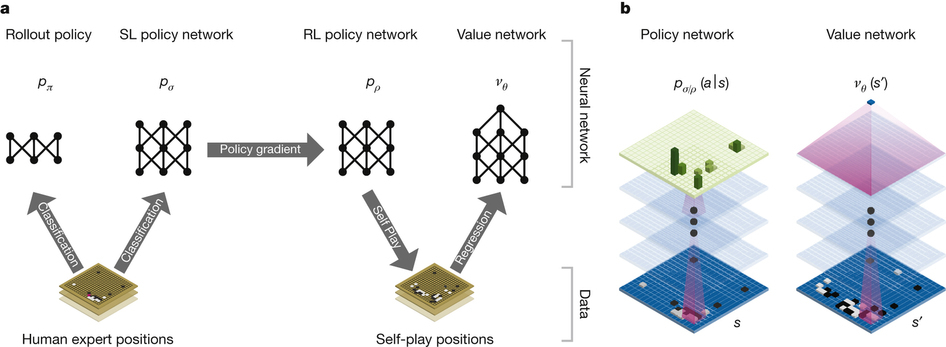Artificial Intelligence defeated a professional player in th
It was AlphaGo from Google
Google ’s DeepMind said the company ’s artificial intelligence was able to defeat European board game champion go . AlphaGo system beat a man in 5 out of 5 games. Before that, go was one of the few logic games whose professional players won over computers.
One of the clear indicators of the development of artificial intelligence is a victory in logic games. AI can beat the champion in any logical game, which will demonstrate that the algorithm can solve the problem better than humans. Over the years, the number of conquered games is growing: both checkers and chess surrendered. In 1996, the algorithm first won against the best chess player: it was a Deep Blue computer duel against Kasparov. And already in 2005, the man last won against the best algorithm. Since then, computer programs can beat any chess player. Other games lend themselves to the following: Watson Aybie’m played and won at Jeopardy, and in 2014, Google’s search giant artificial intelligence mastered 49 old Atari arcade games .
But some games are not yet conquered. One of the unaccounted for a long time remained go. This is a board game that originated in ancient China several thousand years ago. A rectangular board of 19 × 19 lines is filled with black and white stones. Each of the players is faced with the task of blocking a larger territory with stones with the stones than the enemy. The game has several rules that made it difficult to create an effective artificial intelligence system to defeat a person. For example, there are more than possible positions of stones on a standard board than in googol (10 100 ) times more than in chess. The number of possible positions is greater than the atoms in the universe. It’s impossible to calculate all the moves just like that, and so far the best computer systems play at the amateur level.
Many moves in go are dictated by simple intuition, and it is difficult to put such things into an algorithm. It is this complexity that attracts the attention of experts in artificial intelligence. DeepMind is the artificial intelligence system developer Google acquired in 2014. DeepMind was able to create software that is able to beat champions.
Creating a search tree is not suitable here, so the AlphaGo system was created. It is based on Monte Carlo searches and deep neural networks. Neural networks pass the description of the state of the board through 12 different layers consisting of millions of neural-like compounds. One of the networks, the “network of politics," chooses the next move. Another, the “value network,” predicts the winner.

The neural network was trained for 30 million moves of lots of real people. The result of correct prediction of the next move was achieved in 57% of cases. Prior to AlphaGo, the best result was 44% . But the goal was victory, and not just imitation of man. AlphaGo learned this by way of thousands of games between its own neural networks and by improving connections during reinforcement learning . At the same time, the whole process required considerable computing power, so everything was launched in the Google Cloud Platform cloud.
First, the resulting product was tested with other best solutions. AlphaGo won 499 matches out of 500. Then a judge from the British Federation go, editor of Nature magazine and three - time European champion were invitedFan Hui. This professional player has been practicing the Asian Go Board Game since he was 12 years old. The match behind closed doors was held at the London office of Google in October last year.
To run the algorithm, a computing cluster of 170 video cards and 1,200 processors was required (probably, separate kernels were meant). Fan was surprised to find that he lost the computer in the first game. The champion attributed the defeat to his own non-aggressive style. He considered that it was only a warm-up, and began to play more aggressively. But Fan lost all of the four subsequent games. AlphaGo has won five out of five games.
According to Google, this is the first time that a program has been able to defeat a professional go player. It should be noted that Fen has the title of champion of 2013, 2014 and 2015 only in Europe, where the level of ownership of go is not very high. The next logical step is the match in Seoul in March against the legendary Korean go-pro Lee Sedol , the best go player in the last decade. The level of play of this person will be much higher. For this match, system performance will be improved so that it can be run on more modest equipment.
Go is played by tens of millions of people around the world. The gradual conquest of another logical game is important. But it’s also interesting that AlphaGo was not created using manually defined rules. Machine learning helped win.
Google hopes to use the experience gained to solve real-world problems. The fact of using general-purpose methods means that such algorithms can be used in many systems: from climate modeling and disease analysis to stock trading on the stock exchange.
On Wednesday, the results of the study were published in the scientific journal Nature. Recording of the moves of games with Feng can be downloaded from the DeepMind website , and they can also be viewed in a web widget .
They are engaged in similar development on Facebook. Mark Zuckerberg said on Wednesday that his researchers are close to conquering the Chinese game. Zuckerberg literally closely follows the development process: the author of the project sits six meters from the table of the Facebook Executive Director.
Facebook research: arXiv: 1511.06410 [cs.LG]
